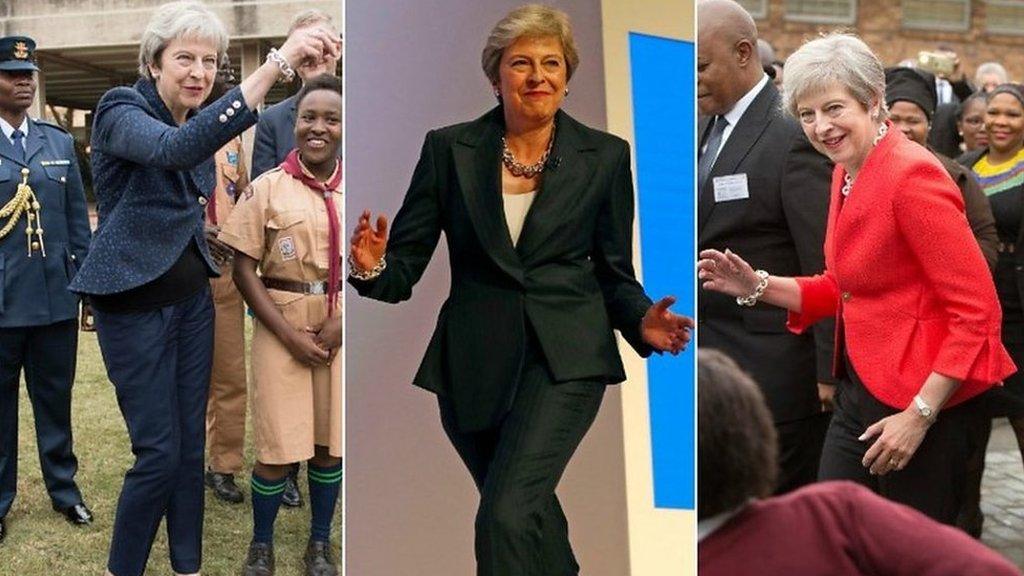Week ahead in Parliament
- Published
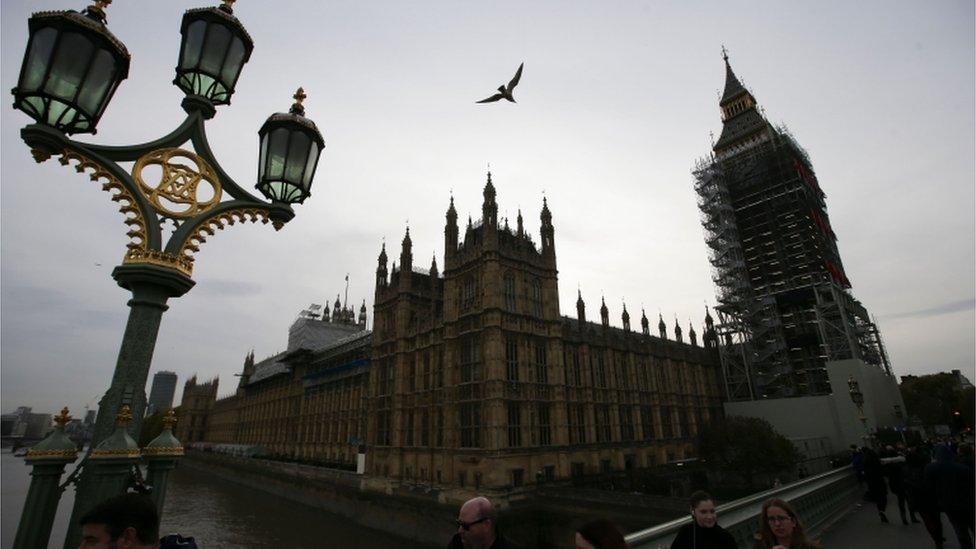
Parliament remains becalmed. Behind the scenes Westminster may seethe with politicking and angst, but the front of house legislative agenda is threadbare, leaving MPs to busy themselves with nuggets of technical legislation and general debates.
And until there is a new government, armed with a new agenda, expect more of the same.
The work of the select committees and some of the Westminster Hall debates highlight the issues that will pack the in-trays on incoming ministers, when a new prime minister takes office - local council finance, court closures, refugees...
One interesting emerging question, though, is whether Parliament will get a chance to ratify (or reject) the new prime minister who emerges from the Conservative leadership contest?
Might there be a bit of an interval between a winner being declared and Theresa May advising the Queen who she should send for, during which some kind of confidence vote could be held in the Commons?
Watch this space.
Finally, a shameless personal plug: It is 40 years since MPs voted to create the current select committee system - and in Radio 4's Archive Hour I look at how the committees emerged as a power in the land - revisiting some of the high drama and occasional low comedy from the last four decades.
That's Speaking Truth to Power at 20:00 BST on Saturday 15 June. Enjoy.
Meanwhile, here's my rundown of the week ahead:
Monday 17 June
The Commons week begins (14:30) with Housing, Communities and Local Government Questions, probably followed by the usual crop of post-weekend ministerial statements and urgent questions, beginning at 15:30.
The day's legislating is on the second reading of the Non-Domestic Rating (Lists) Bill. This implements the chancellor's budget promise to bring forward by one year the next revaluation for non-domestic rates in England and Wales to 1 April 2021.
The idea is that more frequent revaluations will ensure that business rates bills are more up-to-date in reflecting property values, and the bill will also shift to 3-yearly cycle of revaluations.
In Westminster Hall (16:30) there's a debate on e-petition 229004 "that Cats killed or injured by a vehicle are checked for an identification chip".
The petition argues that "thousands of cats are just disposed of every year without being scanned for a chip after being involved in road traffic accidents.
"Owners search for months and years and never get closure. Scanning takes two minutes. Cats are a part of a family and deserve to be returned home, not thrown into landfill."
On the committee corridor, Public Accounts (16:00) looks at Network Rail's £1.46bn sale of railway arches - 5,261 rental spaces across England and Wales, more than half in London, and the concerns about the long-term value for money from the deal, and its impact on tenants.
In the Lords (14:30) questions to ministers include the Conservative Lord Hayward asking about the introduction of the 10p plastic bag charge in England.
The main debate is on the Women Deliver 2019 conference, held in Vancouver, and the role the UK plays internationally in promoting global gender equality and sexual and reproductive health and rights
Tuesday 18 June
MPs begin (11:30) with Health and Social Care Questions, starring ex-leadership candidate Matt Hancock.
The day's Ten Minute Rule Bill, from Conservative ex-minister Sarah Newton, provides a suggestion aimed at helping the government meet its newly unveiled target to cut the UK's net carbon emissions to a net zero, by 2050. She wants to set up a mechanism to boost home energy efficiency.

Next, the House will be asked to approve an ecclesiastical measure on church representation and ministers - this simplifies the processes for standing to elections to Parish Church Councils, Deanery Synod and General Synod, cutting some of the bureaucracy out of the process.
It also makes provisions for joint councils in multi-parish benefices to reduce the administrative burdens on clergy and laity. And before long they'll turn to a statutory instrument aimed at avoiding duplication between the lists of people barred from working with children in England and Scotland.
The main debate is on a backbench motion on the implementation of Dame Laura Cox's report into the bullying and harassment of House of Commons staff.
Women and Equalities Chair Maria Miller wanted to review the progress dealing with the "widespread culture of bullying and harassment" identified in the report.
One driver for this debate is the resignation (over the government's Brexit policy) of the previous Leader of the House, Andrea Leadsom.
She had been seen as the driving force behind moves to change the culture in Westminster - I wonder if she might speak from the backbenches?
In Westminster Hall, the opening debate (9:30) sees a cross-party group of international development heavyweights, including former International Development Secretary Andrew Mitchell and select committee chair Stephen Twigg discussing the continued importance of international humanitarian law in protecting civilians in conflict.
Expect the discussion to range across Yemen, Syria, Rwanda and Sudan. The MPs will also discuss the serious international repercussions of a lack of respect for international humanitarian law by armed parties, including the difficulty of building sustainable peace and reconciliation, and increased refugee flows.
My eye was also caught by Plaid Cymru MP Ben Lake's debate (11:00) on attracting diplomatic representation to Wales.
Inspired by the Irish government's decision to re-establish a consulate general in Cardiff, earlier this year, in hope of strengthening political and economic ties, he wants the UK government to encourage the 30 countries that already have honorary consuls in Wales to upgrade their diplomatic missions. The hope is that this could help to attract foreign investment.
Other subjects for debate include teaching migration in the history curriculum (14:30) and the Colombia peace progress (16:30).
It's a busy day on the committee corridor.
Watch out for the Digital, Culture, Media and Sport Sub-Committee on Disinformation (10:30), which takes evidence from Bob Posner, the chief executive of the Electoral Commission,
The Housing, Communities and Local Government Committee (10:00) holds the closing session of its inquiry into local government finance quizzing the Minister for Local Government, Rishi Sunak.
The committee will focus on how local authorities can plan for the long-term uncertainty over the likely settlement and after a 30% fall in funding, combined with increasing service pressures and statutory obligations. It will also look at the local tax system, including the impact of business rate retention and potential for reforms to council tax.
In the Lords (14:30) the main event is the report stage consideration of the Census (Return Particulars and Removal of Penalties) Bill, where the key issues are around the penalties.
There is also a regret motion against a statutory instrument on the Children's Homes etc Inspection, Childcare, Adoption Fees Regulations, from the crossbench peer Lord Russell of Liverpool.
His criticism is that the regulations revoke the duty on adoption agencies to provide information about children approved for adoption and approved prospective adopters who have not been matched.
He says the government has failed to justify these decisions, or explain how it intends to mitigate the risk of reduced provision for children who may be harder to place. A vote is likely at around 17:00.
The day's final business is a 90-minute debate on the Cadet Expansion Programme in schools and the steps taken to encourage the growth of cadet units of all three services
Wednesday 19 June
Commons business opens (11:30) with half an hour of Scotland questions, followed by Prime Minister's Question Time - an increasingly tepid and poorly attended affair in recent weeks.
The day's Ten Minute Rule Bill, from the Labour MP Luke Pollard would require the government to prepare and report on a strategy to recycle out-of-service nuclear submarines, 13 of which are tied up in his Plymouth constituency - with a further six in Rosyth. More will be joining them as more subs go out of service.
Then MPs turn to the report and third reading of the Parliamentary Buildings (Restoration and Renewal) Bill.
This sets up an Olympics-style governance system for the multi-billion pound restoration programme for the Victorian Palace of Westminster.
The bill is on a free vote, but there are a number of issues that will be pushed, including an amendment from Labour on only using contractors involved in blacklisting if they have signed a trade union recognition agreement.
This was defeated on party lines at committee stage, but they are trying again. The government says it is sympathetic but as so many firms were involved in blacklisting it would complicate an already challenging project.
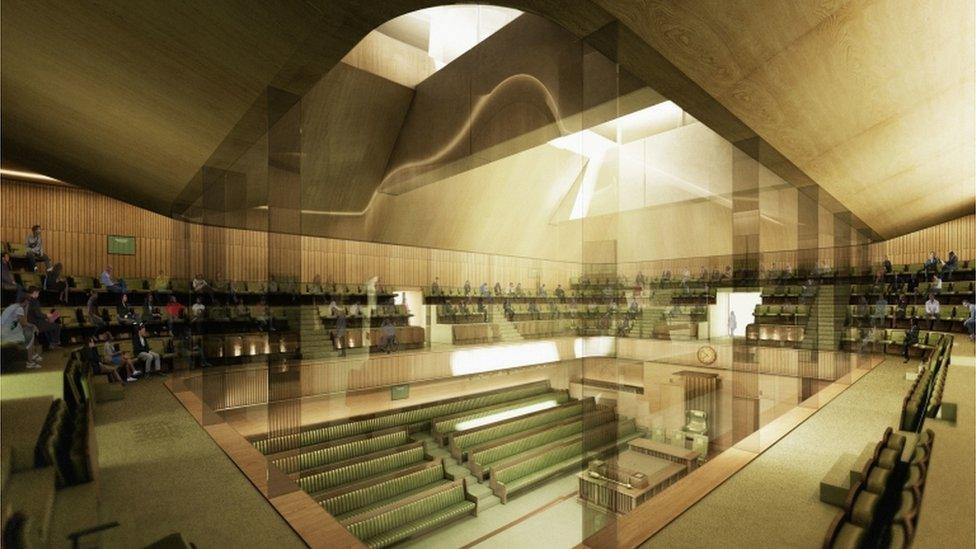
Parliament authorities plan to temporarily shift the Commons chamber into existing buildings on the parliamentary estate
The Labour front bench are pushing this on the argument that there is little long-term downside for companies involved in blacklisting (and maybe also because they will be glad to have a cause all their MPs can support?).
There has also been some discussion about ensuring that the official financial watchdog, the National Audit Office has full access to the books - including to private contractors.
And beyond that, there will be cross-party pressure to ensure that the work is spread across the nations and regions, with small businesses as well as mega-contractors getting a chance to work on what will be a long-running mega-project.
In Westminster Hall, Work and Pensions Committee chair Frank Field leads a debate (14:30) on the Independent Review of the Modern Slavery Act, which he chaired and which made 80 recommendations aimed at toughening the laws introduced in 2015. He says there have been "too few" convictions under the Act, and he says ministers need to give teeth to it.
Other subjects for debate include the future of free schools (9:30); East to West Midlands railway connectivity (16:00) and Jewish refugees from the Middle East and North Africa (16:30).
My committee corridor pick is the Transport Committee session (9:45) on pavement parking, and there may be more than the usual interest in the International Development Committee hearing (14:30) with Secretary of State and leadership candidate Rory Stewart talking about UK progress on the Sustainable Development Goals.
In the Lords, Labour peer and former chair of the Metropolitan Police Authority, Lord Harris, has a pointed-looking question on the UK's ability to tackle illegal arms coming into the country post-Brexit.
The main event is the second reading Wild Animals in Circuses (No.2) Bill, the measure banning of the use of wild animals for entertainment purposes. This is followed by a 90-minute debate on the steps being taken to empower widows in developing countries and to mark International Widows Day 2019.
And watch out for what promises to be an entertaining session of the Lords EU Energy and Environment Sub-Committee. The committee will be asking whether there is any evidence that consumers are confused by the use of terms such as 'burger' and 'sausage' to describe vegetarian products. They will put that question to witnesses from the National Farmers' Union the Vegetarian Society, the Vegan Society and Quorn Foods.
Thursday 20 June
The Commons begins (9:30) with 40 minutes of Environment, Food and Rural Affairs Questions, starring leadership contender Michael Gove.
Then comes the monthly mini-question time for the MPs who speak for the Church Commissioners, the House of Commons Commission and the Speaker's Committee on the Electoral Commission.
The new Leader of the House, Mel Stride, will deliver his second Business Statement, which may see the announcement of a second reading debate for the Domestic Abuse Bill.
The main debates are on two motions chosen by the Backbench Business Committee, on Refugee Family Reunion, to mark Refugee Week.
The UK Government has given 5,806 family reunion visas to partners and children of refugees, but the sponsors of the debate want to highlight the fact that the UK is one of the few countries that does not give the same rights to child refugees as it gives to adult refugees.
That is followed by a general debate on Court Closures and Access to Justice.
In the Lords (11:00) peers have a series of "balloted debates" - that is debates on subjects raised by backbenchers. The first on the incidence of anti-Semitism worldwide; and the second on the case for better protecting and representing the interests of future generations in policymaking.
It is a mark of how flat parliament is at the moment that there seem to be no takers for the usual Thursday afternoon topical mini debate.
There is some rare Thursday committee action; the Lords EU External Affairs Sub-Committee (10.10) takes evidence on the Iran nuclear deal.
- Published18 July 2019
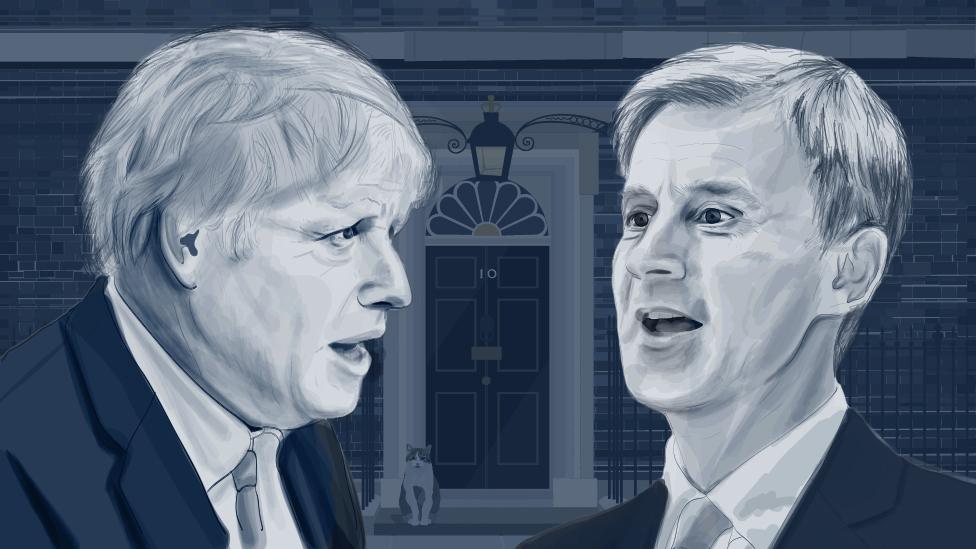
- Published23 July 2019
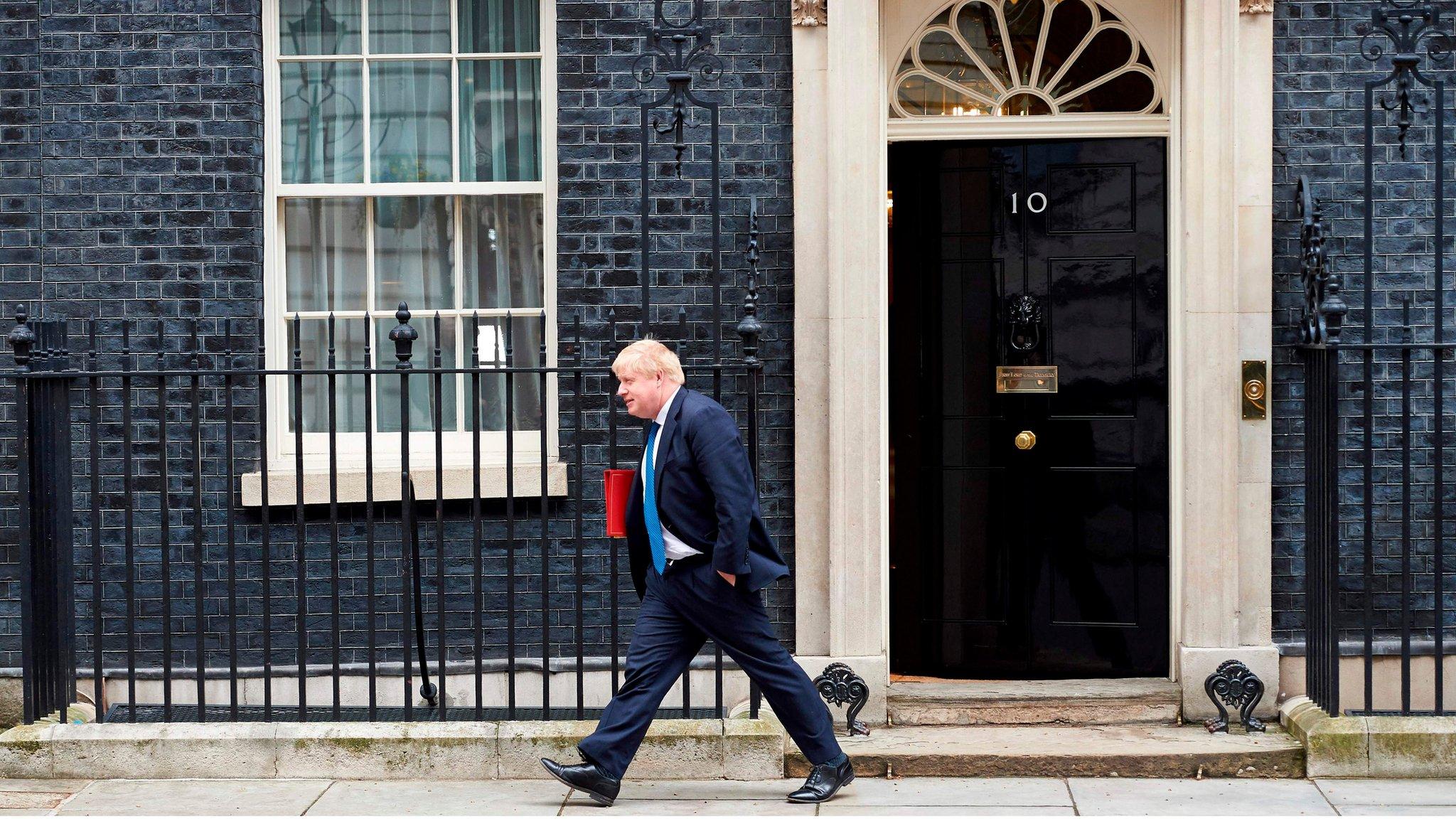
- Published7 June 2019
